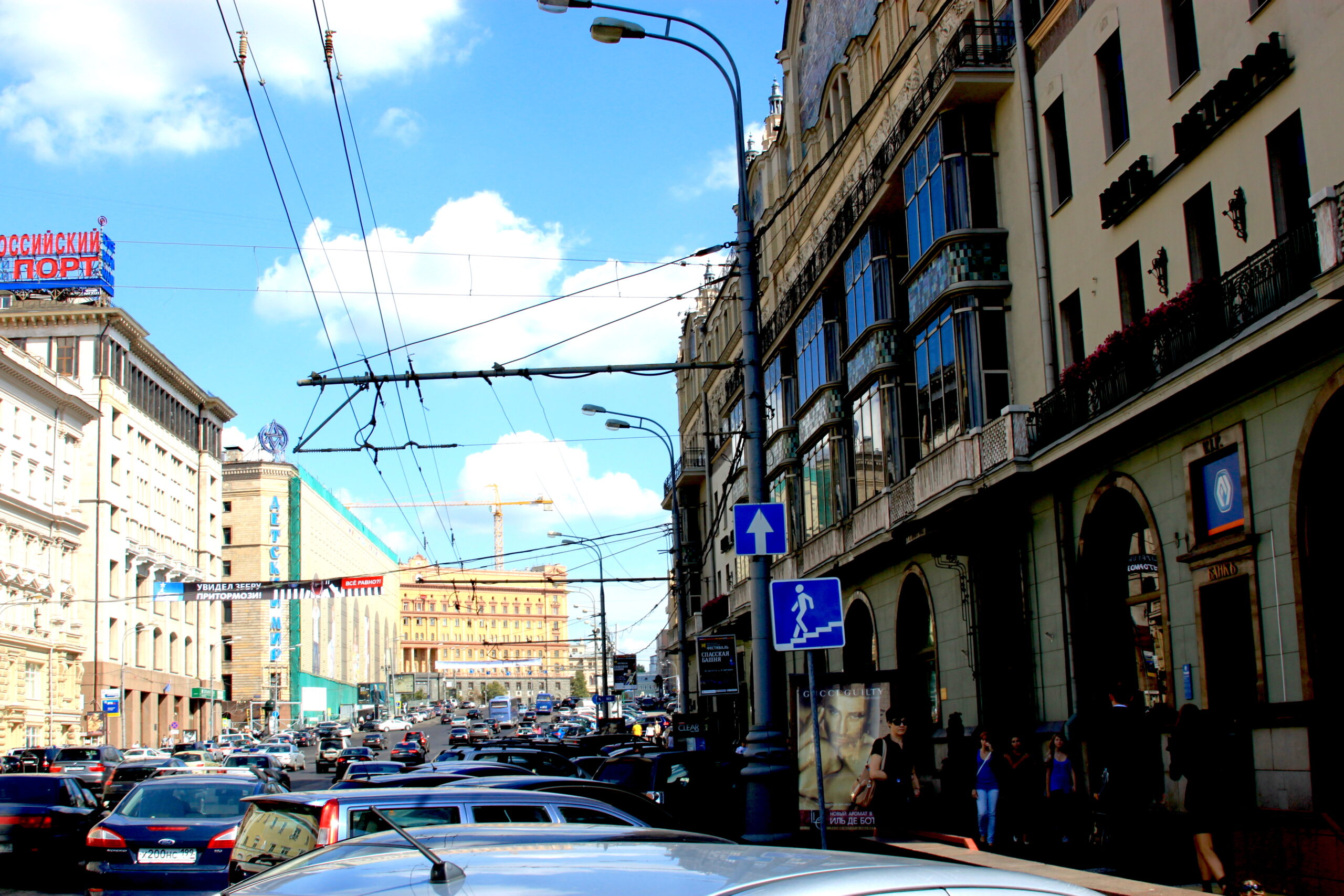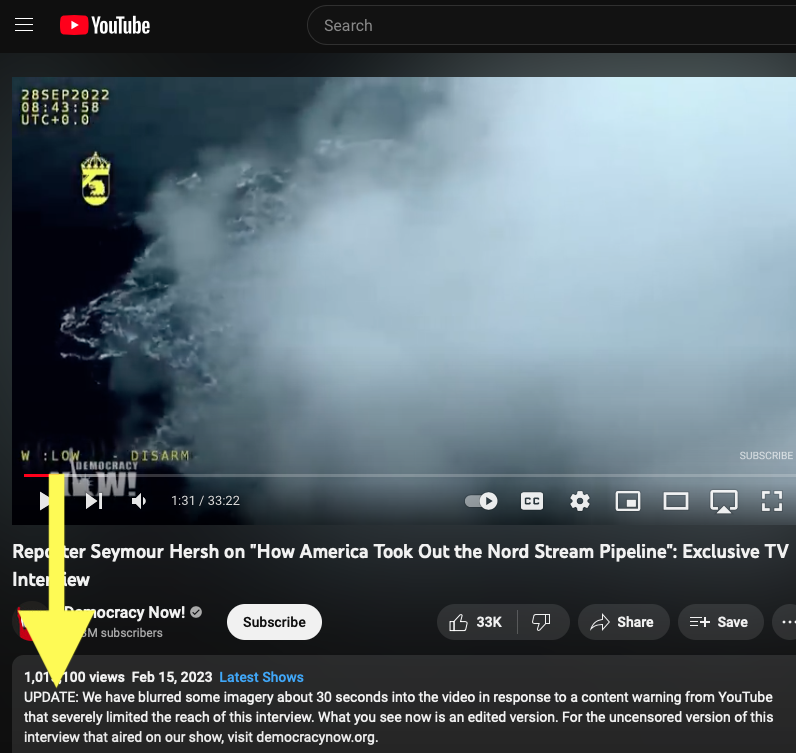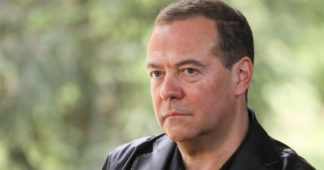Content warning, canceling, de-platforming, denying access: The fate of Sy Hersh’s Democracy Now! interview on YouTube is the latest indication of how much rougher press suppression is in this new media era.
By Patrick Lawrence
Feb 20. 2023
When I awoke Sunday morning to the news that YouTube had censored a long interview Seymour Hersh did with Democracy Now! on the grounds that it did not meet the Google subsidiary’s “community standards” and was, moreover, “offensive,” my mind went in many directions.
I thought of the New York Post case in October 2020, three weeks before the presidential election, when Twitter, Facebook and the other big social media platforms blocked America’s oldest daily after it reported the damning, politically damaging contents of Hunter Biden’s laptop computer.
I thought of what we now call “the disinformation industry” and all these diabolic organizations — PropOrNot, NewsGuard, Hamilton 68, et al. — that, stocked with spooks serving in staff positions and as advisers, dedicate themselves to discrediting dissenting writers and independent publications as conveyers of Russian propaganda.
And then I thought of a story a Russian acquaintance told me one afternoon over drinks when I was in Moscow some years back. Leonid was a professor of sociology at Moscow State University and had served the Central Committee and the Politburo in various advisory capacities during the Soviet era. Leonid knew how to ride the waves, let’s say, and he knew whereof he spoke. He also had a wonderful sense of humor and a highly developed appreciation for life’s infinite ironies.
Let me pass on his tale and then make the connection with Hersh’s exposé of the Biden regime’s Nord Stream op and the other cases I have mentioned.
We had been talking about the press, in Russia, in America, in Asia, and elsewhere, trading observations and comparing notes. It was then, in the bar at the old Metropole Hotel, that Leonid related a story he thought I would find useful or amusing or both.
Recollection at the Metropole

Northern facade of the Hotel Metropol in Moscow, 2011. (Alexey Vikhrov, CC BY-SA 3.0, Wikimedia Commons)
During one of the periods of Soviet–American détente in the 1970s, the State Department offered to take two Foreign Ministry bureaucrats on a tour of the United States. They visited five cities — New York, Washington, Chicago, Los Angeles and San Francisco — with the minders from State taking care to show their guests the sort of things minders from State would want Soviet visitors to see. A certain camaraderie developed. It is nice to think about the scene, impossible as such occasions have become.
When they reached San Francisco and it was time to say farewell, the State Department’s shepherds asked the two Soviets what aspects of American life they found most remarkable. The Sovs seem not to have hesitated before replying.
In the Soviet Union, they said, all the newspapers across 11 time zones say the same thing every day because they are carefully censored. They are told routinely what to say and what to leave out. Here in America the press is free. We have seen no sign of censorship in all the cities you have shown us. And yet wherever we are, when we pick up a newspaper they, too, say the same thing. From New York to California, nothing we have read is ever any different.
There is externally imposed censorship and there is internally imposed censorship, to state the obvious, and the two Soviet bureaucrats were fascinated to see, firsthand and for the first time, the latter at work. Brute censorship is nothing pretty to look at, Leonid, my Russian acquaintance, meant to say. But the invisible kind is just as effective.
Everyone in mainstream journalism knows where the fence posts are, as I like to put it, and if you spend too much time beyond them you won’t work in mainstream journalism very long. I wonder if Seymour Hersh, certainly proven to rank among the great journalists of our time, may have a thought about this.
Internalized Censorship
This question of internalized censorship, commonly known as self-censorship, has long fascinated me. I have watched many times as journalists, surrendering themselves for the sake of their professional careers, train themselves to hear the silent language that tells them what to say and what to leave unsaid. And then, over time, you find them giving vigorous voice to thoughts and beliefs imposed upon them, absolutely convinced these are their own thoughts and beliefs and they have come by them independently.
The modern mind’s eager desire to conform while we remain certain of our originality and individuality: Philip Slater touched on this in his too-soon-forgotten The Pursuit of Loneliness, published in 1970. So did Erich Fromm in Escape from Freedom, which appeared in 1941 and could hardly be more pertinent to our time:
“We are proud that in his conduct of life man has become free from external authorities, which tell him what to do and what not to do. We neglect the role of anonymous authorities like public opinion and ‘common sense,’ which are so powerful because of our profound readiness to conform to the expectations everybody has about ourselves and our equally profound fear of being different.”
I have had overbearing editors I greatly wished were more anonymous than they were, but let us set this minor point aside. Fromm and Slater are concerned with the collective psychology from which self-censorship draws for its extraordinary effectiveness. “Compulsive conformity,” Fromm calls it.
We can go back as far as Alexis de Tocqueville to gain a sense of how deeply rooted this conformity is among Americans. When we do, we cannot be surprised or mystified to note what the Soviet visitors noted 50–odd years ago and what we fail to see even as it is before us in plain sight: American media are as rigorously controlled via the mechanisms of internalized censorship as any newspaper in any of the “authoritarian” societies we profess to detest for their lack of freedom.
But what happened to Sy Hersh’s Democracy Now! interview last weekend, to the New York Post in the final weeks of Joe Biden’s presidential campaign, and to a lot of independent journalists at the hands of the disinformation industry since this took shape a half-dozen years ago requires us to think anew.

It is commonly said that the emergence of digital media since the mid–1990s, when the first such publications appeared (and when Bob Parry started publishing Consortium News), has brought us into a new era. And we can mean many things by this. Let us not now miss: For all the good these new media have done and for all the doors they promise to open, this new era is to be one of coercive, externally imposed censorship as heavy-handed as anything those visiting Sovs had lived with all those years back.
With the decline of our legacy media into craven subservience to power to an extent no one could have dreamed of a couple of decades’ back, independent media such as Consortium News are where the future of the Great Craft lies, a point I have made severally in this space. But it seems to me the digital platforms on which these media depend have been liabilities as well as assets from the first.
Technologies are not value-neutral. Jacques Ellul, the Christian anarchist and many-sided intellect, made this case in The Technological Society, which came out in English in 1964. To put his thesis too simply, technologies are not empty of content other than what is put into them. Implicit in any technology is an affirmation of the political economy and material circumstances that produced it.
In other words, the technologies available to independent journalists are corporate products. They are vital to independent practitioners as means of delivery, but, as we learn by the day now, access to them can be withdrawn at any time. Many of us seem to have missed this contradiction. Now we are pressed to recognize it.
As we do, we are led to ask whether the promise of independent journalism can be extinguished by way of a totalized system of censorship. Do you think this phrase too strong? Marc Andreessen, the founder of Netscape, the web services company, and an influential figure in Silicon Valley, doesn’t. In the spring of 2022 Andreessen sent out this note via Twitter:
“I predict essentially identical censorship/deplatforming policies across all layers of the internet stack. Client-side & server-side ISPs, cloud platforms, CDNs, payment networks, client OSs, browsers, email clients. With only rare exceptions. The pressure is intense.”
I do not know how far we are from the world Andreesson warns us of. But is there an argument that we are headed in the direction he forecasts?
I do not wish to diminish the importance of independent media, a point I hope is by now clear, but to turn these thoughts another way, it is one thing to bully, cancel and otherwise suppress emergent publications and greatly another to censor a legacy newspaper such as the New York Post and a journalist of Seymour Hersh’s stature. My conclusion: The game is getting rough and is likely to get a lot rougher.
There is one other factor forcing the pace of America’s censorship regime that bears mentioning. This concerns the larger context. By the time digital media began to find their place in public discourse, the events of 2001 had forced the American imperium onto its back foot, and it has ever since assumed the hostile crouch of the wounded. As history teaches us, it is at this point that declining nations require the loyalty of all economic, political, industrial, and cultural institutions. Accordingly, the line between the national security state and corporate media has not been merely blurred in the post–2001 era: It is now more or less eliminated, as documents such as the Twitter Files make clear.
Are we surprised? We ought not be. Next question: What are we to do as an era of totalized censorship appears to be upon us? Subscribing to the independent publication of your choice would be a conscientious start.
Portions of this column are extracted from the author’s book, Journalists and Their Shadows, forthcoming from Clarity Press.
* Patrick Lawrence, a correspondent abroad for many years, chiefly for the International Herald Tribune, is a columnist, essayist, author and lecturer. His most recent book is Time No Longer: Americans After the American Century. His Twitter account, @thefloutist, has been permanently censored. His web site is Patrick Lawrence. Support his work via his Patreon site. His web site is Patrick Lawrence. Support his work via his Patreon site.
We remind our readers that publication of articles on our site does not mean that we agree with what is written. Our policy is to publish anything which we consider of interest, so as to assist our readers in forming their opinions. Sometimes we even publish articles with which we totally disagree, since we believe it is important for our readers to be informed on as wide a spectrum of views as possible.











